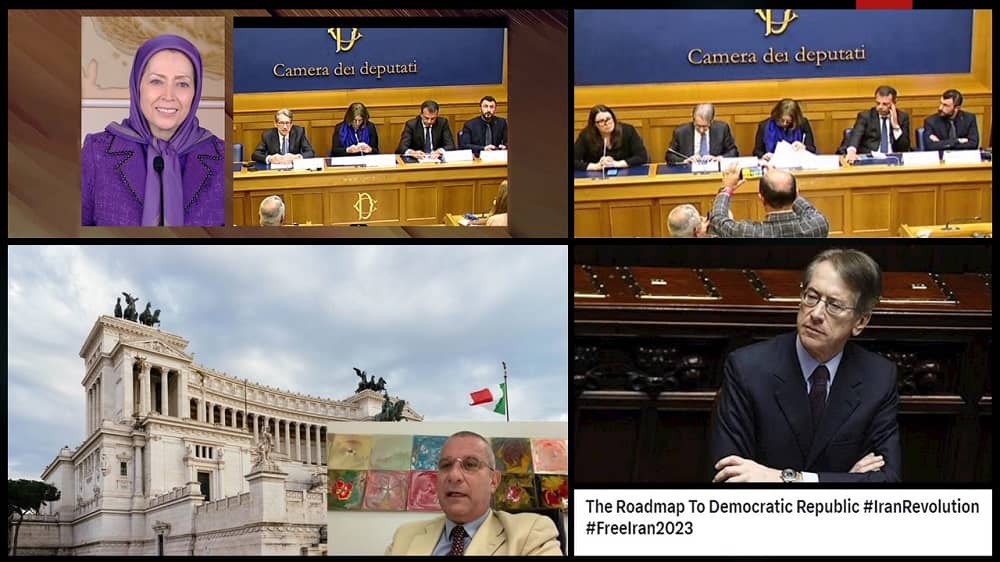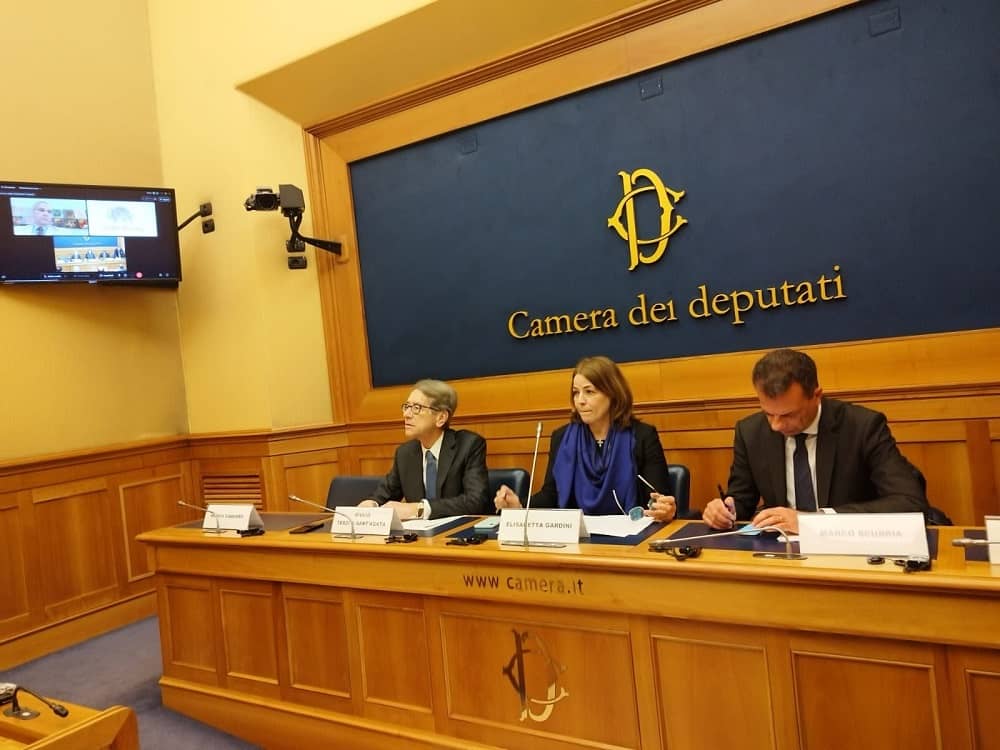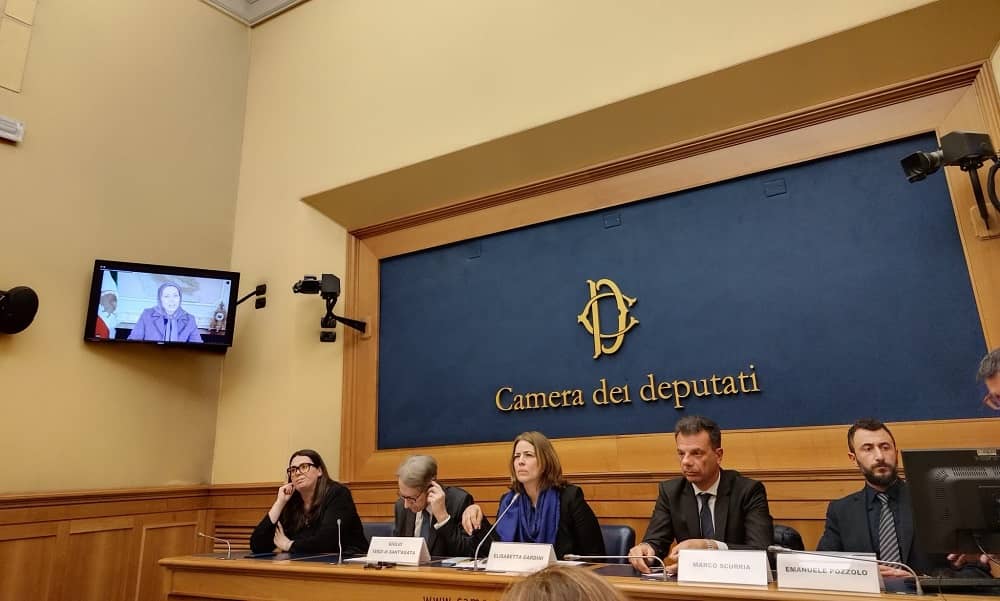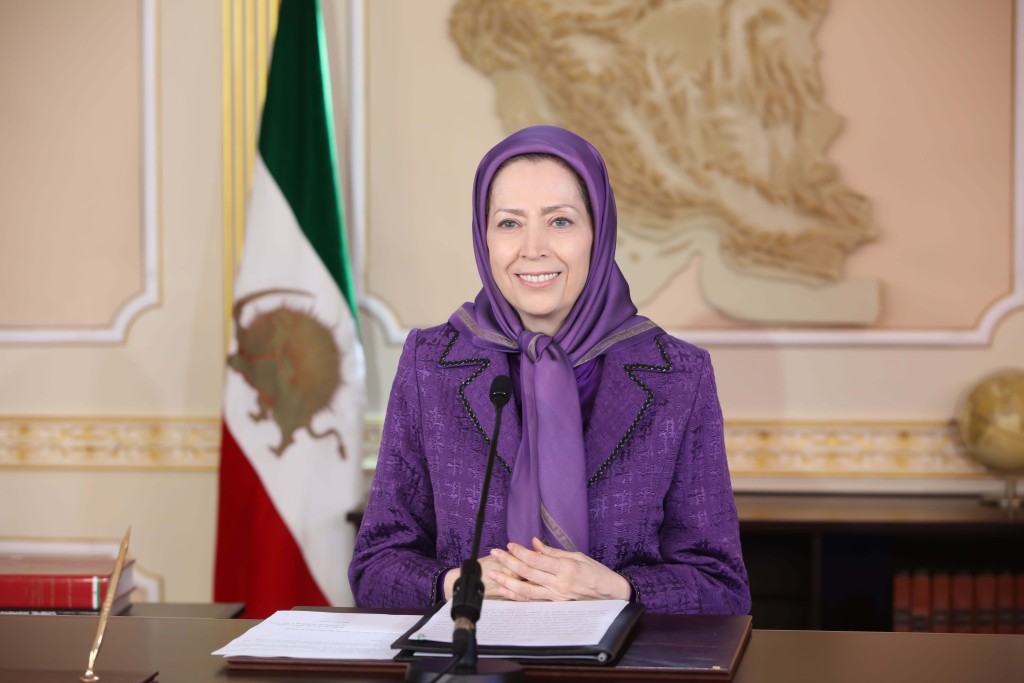Several Italian parliamentarians held a press conference in Rome, Italy to announce a new cross-party initiative calling for a change in Iran policy.
Members of the Italian Senate discussed not only the terrorist designation of the Iranian regime’s IRGC but also the nationwide uprising that has advanced across Iran over the past seven months, as well as the regime’s countermeasures, including chemical attacks on students, especially schoolgirls.

Maryam Rajavi: The Italian Senate’s majority support for the Iranian uprising and Resistance and rejection of all forms of dictatorship, including both monarchical and religious regimes
Maryam Rajavi joined and addressed the conference online. Following is the text of her remarks:
Dear friends, honorable Italian lawmakers,
I want to express my gratitude for your attention to the Iranian people’s fight for freedom and democracy. Thankfully, Italian society and its elected representatives have been aware of the Iranian issue for a long time.
Our countries have a long history of cooperation and exchange in cultural, scientific, and economic fields. However, the prolonged reign of two dictatorships – one monarchical and the other religious – has kept our nation mired in backwardness.
In 1979, the Iranian people revolted to establish freedom and democracy, but the mullahs hijacked the revolution. They used the immense energy released by the revolution to foment war, terrorism, and destruction.
The clerical regime’s history is characterized by state terrorism, chaos in the region, and the occupation of some countries. The repression of the Iranian people has reached catastrophic levels, with the execution of over 120,000 of the regime’s opponents and the imposition of discriminatory policies against women.
A regime in a deadly impasse
Over the past five months, the Iranian regime has been carrying out a premeditated plan to target girls’ schools with chemical attacks. These poisonings are intended to intimidate women and girls and discourage them from participating in the anti-regime uprisings, where they have played a leading role.
So far, the regime’s horrific attacks have targeted at least 505 schools in 109 cities, and amid the regrettable international silence, they claim victims daily.
It should be noted that this persecution, in essence, attempts to find an escape from the deadly impasse inside the country.
The series of uprisings in recent years escalated into a widespread and powerful uprising in September 2022, marking a turning point in the fate of the religious dictatorship. And it exposed to the world the fragility and vulnerability of the regime, which we have been emphasizing for years.
A 50 percent inflation rate, a 50 percent budget deficit, the free fall of the country’s official currency value, increasing unemployment, systemic government corruption, and an almost paralyzed economy continue to persist. However, beyond these factors, the regime’s fragility stems from its confrontation with a fiercely rebellious society that seeks to overthrow it.
To understand the current situation in Iran, it is essential to pay attention to the regime’s widespread arrests. In March, the mullahs’ Judiciary Chief, Gholamhossein Mohseni Ejei, announced that over 22,000 people arrested during the uprising had been released. It is undeniable that, in an effort to quell the uprising, the regime has arrested tens of thousands of people.
However, this massive crackdown has been unable to silence the protest movement, which continues to be a nightmare for the regime. Two weeks ago, the commander of the Anti-Riot Units announced that the regime was increasing its forces to contain the uprising in 400 cities.
The National Council of Resistance of Iran, a democratic alternative
Why have the clerics been unable to suppress the uprisings? It is because they are facing an explosive society where people are unwilling to tolerate the status quo.
However, this discontent is not shapeless or spontaneous. The organized network of the People’s Mojahedin (PMOI) in various provinces, with its combat-ready units operating as Resistance Units, is playing a significant role in organizing the uprising and maintaining its continuity.
In the six months after the beginning of the uprising, more than 3,600 PMOI supporters were arrested or disappeared. However, these arrests could not limit the scope of activity and growth of the Resistance Units.
The responsibility for advancing the uprising, complemented by broad social, political, and international activities, lies with the democratic alternative, namely the National Council of Resistance of Iran (NCRI).
The NCRI includes groups and individuals with diverse political and ideological leanings.
This coalition, which was founded 42 years ago to overthrow the regime, is pursuing an Iran that has been freed from past tyrannies, such as monarchy and presents religious tyranny, to build a future based on the people’s sovereignty. A democratic republic is distinguished by several fundamental principles: separation of religion and state, gender equality, autonomy for nationalities, abolition of the death penalty, and a non-nuclear Iran.
According to the NCRI’s program, a provisional government will be formed after the overthrow of the clerical regime, for a maximum of six months, for the peaceful transfer of power to the people’s representatives. Its main task is to hold free elections to form the Constituent Assembly.
The Constituent Assembly has two critical duties: first, to form a new provisional government based on the people’s vote and second, to draft a constitution for the new republic.
In addition to the Iranian people, the NCRI’s program enjoys remarkable popularity among people’s elected representatives in the United States and European countries.
European and American representatives support the Iranian people’s Resistance
The joint declaration of the Italian Senate majority is a significant show of support for the Iranian people’s Resistance and their efforts to reject all forms of dictatorship, including both monarchical and religious regimes, and establish a democratic republic.
I would like to express my appreciation to Senators Terzi and Scurria for sponsoring this initiative.
Based on the experience of the past several decades, the Iranian people and Resistance consider the Italian parliament and Senate, and the freedom-loving and honorable lawmakers, among their best friends.
The majority of the US Congress has also cosponsored a resolution supporting the Iranian people’s struggle against the Shah and the mullahs, as well as the Resistance’s Ten Point Plan to establish a democratic republic based on the separation of religion and state.
Additionally, last December, 125 members of the Belgian Parliament, and last March, 250 members of the UK Houses of Commons and Lords issued similar declarations.
Therefore, it is time for Western governments to fundamentally reassess their Iran policies and stand in solidarity with the Iranian people. The great Iran uprising has irreversibly changed the conditions of Iranian society and the status of the regime. The Iranian people’s determination to achieve freedom and democracy cannot be suppressed.
The clerical regime is unable to maintain its rule in the face of the tide of uprisings.
The world community, including Italy, cannot deal with the religious dictatorship ruling Iran with their previous assessments and approach. This is not only against the interests of the Iranian people, who seek to overthrow this regime but against global peace and security that are threatened by this regime.
During the 2009 uprising, Italy’s embassy in Tehran provided refuge to protesters fleeing from the IRGC.
Now, the people of Iran are hoping that Italy will take a stronger stance against the regime. This time, they expect Italy to declare the IRGC a terrorist organization and cease all trade with the regime. Trading with the Iranian regime means trading with the IRGC and supplying fuel to the machinery of repression, terrorism, and warmongering.
Therefore, it is time for Italy to acknowledge the legitimacy and necessity of the Iranian people’s struggle to overthrow the regime and recognize the legitimacy of the struggle of Iran’s courageous youth against the Revolutionary Guards (IRGC).
Thank you all very much.
An excerpt of the speeches of the participants in this conference is as follows:

Senator Giulio Terzi
It is important to understand the situation in Iran. Mrs. Rajavi and the people of Ashraf 3 represent the Iranian people, and they represent the Iranian society abroad. They have established a resistance movement that has become a driving force for freedom. The martyrs of the resistance have sacrificed their lives to stand against this regime.
The work you are doing in parliament is very important to us. We share our destiny with you, which is why we need to keep this relationship with you. The regime has tried to destroy any kind of resistance, and you have stood up against this regime. The regime is trying to quell any kind of resistance, which is what we’re seeing with the poisoning in schools.
Ashraf 3 symbolizes the will to resist the regime. A delegation from the Italian Parliament should go to Ashraf 3 to better understand what is happening. The recent resolution in the Italian Senate expresses its solidarity with the Iranian Resistance and against the mullahs’ suppression of the Iranian people. The regime doesn’t want you to have freedom of thought, but they can’t prevent you. Whoever believes in freedom stands with you.
Western countries should see for themselves what is going on in Iran. The resolution of the Italian Senate is very important and shows the solidarity of the Italian people and their representatives with the Iranian people. I think it should be the basis of our foreign policy toward the regime in Iran. As has been emphasized in [Maryam Rajavi’s] ten-point plan, the regime must be replaced by an interim government that will enable the people to choose the state they want to live in.
We should not give in to the demands of this regime. The IRGC must be put on the list of terrorist organizations. We should not allow the regime to use its diplomatic facilities for terrorist activities.
Emanuele Pozzolo, Member of the Foreign Affairs Committee of the Italian Parliament
A visit to Ashraf 3 will help us better understand the situation in Iran and the Iranian Resistance. The regime has objected to the Italian government our visit to Ashraf. This makes us proud. We must express our solidarity with the Iranian people. The regime is used to spreading lies around the world. We must stand up to these lies.
The foreign policy of Western countries must be based on reality, not the lies of the regime. In my meetings with Mrs. Rajavi, I realized that they are determined to achieve freedom for their people, and they are willing to make sacrifices. We cannot ignore and close our eyes to these facts. They have a strong desire to achieve freedom in Iran.
Senator Marco Scurria
Politicians in Italy must take into consideration that the Iranian people need strong support. Our initiative is to support the Iranian people and their resistance movement. We would like to bring to the table the issue of Iran in the next meeting of the Human Rights Council. I believe that the uprising in Iran, which we must describe as a revolution, will not go away.
We will support this revolution until its end. The media and social media in our countries can be helpful for countries in Iran to help connect Iranians with other people to promote the issue of freedom for the Iranian people. The continuation of this legitimate resistance gives us the opportunity to stand with the people for human rights. We have to take many initiatives to promote these values. Besides demonstrations and protests in front of the Iranian embassy, we must also show our solidarity with the Iranian diaspora and promote the ideals of the Iranian people. Many Iranians in exile have seen terrible scenes in Iran. We must listen to them and take this seriously.
Dictators cannot take the destiny of nations into their hands forever. Iranians don’t want to return to the previous dictatorship. We support the objectives of the NCRI. They correspond to our values. It is also the request of the Iranian people. We are happy to see that Iranians are determined to build their country based on democratic values and lead their country toward democracy.
Andrea Di Giuseppe, Member of the Foreign Affairs Committee of the Italian Parliament
We must see a change in the policy of Western governments. The question of Iran must not only be an issue of ordinary people. It must be taken into consideration in the policies of European governments because without a firm policy and actions, and clear decisions against this regime, we will not be able to achieve our goals.
We need firmness. We are facing a regime that is an insult against humanity and even Islam, the religion that it claims to represent. The pressure on the regime must be very strong. The need to increase the pressure on the Iranian regime is being felt at the international level. We also need to stand in solidarity with the Iranian people.
Today, the regime is siding with Russia in its fight against Ukraine. This is against international peace. This is being discussed on social media, but it must not only stay at that level. We need to see concrete action against the regime, diplomatic actions, or other measures that put more pressure on the regime.
They must know that the decisions they make will have consequences. Unfortunately, suppression in Iran and the dangers and threats against the Iranian people and the international community is not being relayed enough in the media.
MP Stefania Ascari, Italian Chamber of Deputies
I think all lawmakers should visit the Ashraf 3 museum and see what the people of Iran have endured. These people have resisted in the past forty years, and they continue to resist to achieve a free and democratic country.
I must emphasize that in Parliament we must do everything we can to stand in solidarity with them. We must not stay quiet, and we must stand with the Iranian people. We must be responsible about the information that we have to stand up alongside these people.
Senator Giulio Terzi
Mrs. Rajavi and the NCRI are the true voice of the Iranian people. She represents the Iranian people’s desire for democracy. I would like to emphasize one point: many international politicians are saying every day for the past 10–12 years about the threat of the destabilizing activities of the regime in the region and its terrorist activities. We must take this threat very seriously and deal with this monster seriously.
They are trying to obtain nuclear weapons. They are playing a destructive role in Ukraine. This regime is exporting terrorism to other parts of the world. They are gathering weapons and smuggling them to other parts of the world. The regime is going against international norms. We must concentrate on this in our parliament, and we must pursue the correct policy for future generations. The IRGC must be dealt with correctly.


